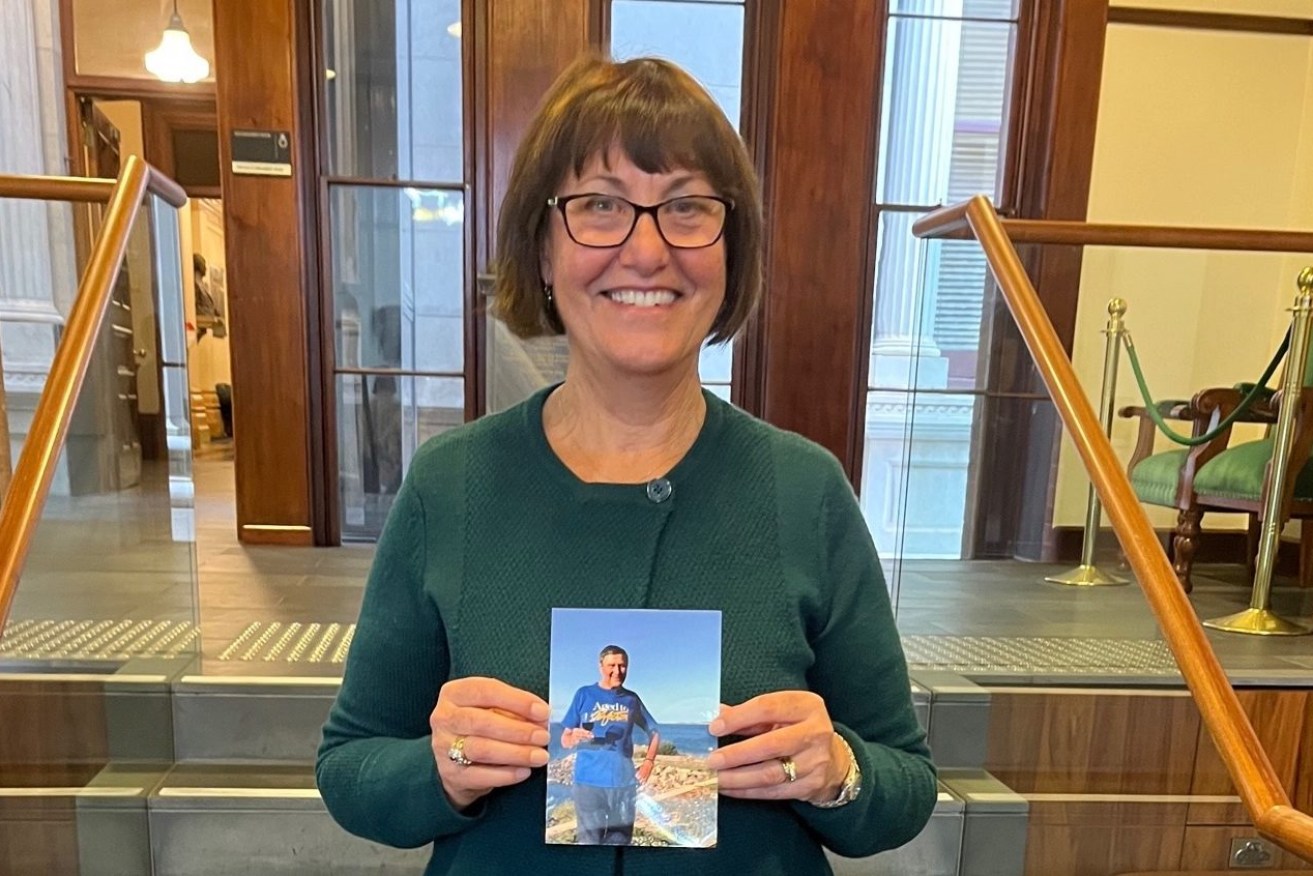A glass of Grange, surrounded by family, retired GP dies under new laws
Seven people with terminal cancer and five suffering with degenerative neurological conditions have died using the state’s new voluntary assisted dying program, including a retired country GP who was peacefully sipping Grange red wine and surrounded by loved ones before passing away.


Andrea Fuller holding a picture of her father Dion Manthorpe who died peacefully under new voluntary assisted dying laws. Photo: supplied
Andrea Fuller told today how her father, aged 95, died with a taste of a favourite wine on March 29 and surrounded by his five children sharing laughs and loving stories, after successfully applying for a permit under new laws introduced in January.
Dion Manthorpe worked as a regional GP in the Port Lincoln region for many years and it was his wish to die on his own terms.
Fuller’s story was told as Health and Wellbeing Minister Chris Picton and the Voluntary Assisted Dying Board’s presiding member Associate Professor Melanie Turner released the first quarterly report into new Voluntary Assisted Dying laws that took effect on January 31 showing 28 South Australians have received a permit up until April 30.
Manthorpe, affectionately known as ‘TD’ was dying from prostate cancer and Fuller said “to us he was an extraordinary man … and to us he did an extraordinary thing” as the illness ravaged his body and caused great pain.
“It’s a pathway that is a good pathway and resulted in a good death and to us it has actually helped us in our grief,” she said, adding that it took just over a month to receive a permit, giving his 17 grandchildren the opportunity to visit or send emails and letters and “he had great joy in that”.
“For him it was probably a bit long, for us children it seemed way too fast, but then I think as loved ones you are always trying to hold onto your loved ones for longer, and he did say that as soon as he gets the substance he wanted to do this as soon as possible.”

Andrea Fuller and her dad, Dion Manthorpe. Photo: supplied
To receive a permit, people need to meet strict criteria including having an incurable, advanced and progressive disease, illness or medical condition expected to cause death within six months – or 12 months for a neurodegenerative condition. Applicants also need to show the medical conditions are causing suffering that can not be made tolerable.
Not all permits granted have been used with Picton saying this is understandable as some people may never use the substances permitted to assist with dying or will use them further down the track.
Picton said “the pathway offers hope, comfort and choice to South Australians with terminal illnesses with many safeguards in place”.
“What we are seeing is South Australians having the ability to choose their own timing of when they are able to pass away, being surrounded by friends and family, being able to do so on their own terms,” he said. “I think it is of great comfort for many people in our community.”
Between 31 January, when the laws took effect, and 30 April, the report showed 28 South Australians received a VAD permit from 60 medical practitioners who have received the mandatory training.
Another 45 medical practitioners are registered or part-way through training.
Associate Prof Turner said the first quarterly report showed there were seven men and five women who have died using the permits, 75 per cent died in their own homes or in family homes, while the remainder died in hospitals. Ten occurred in metropolitan Adelaide and two in regional SA.
Attorney-General Kyam Maher referred to the 16 previous failed attempts across 27 years to introduce the legislation, saying it was a momentous day for South Australians when VAD laws passed in South Australia.
The next phase in the program is to expand services in regional areas.
“With years of advocacy and hard work by so many, it is wonderful to finally see the laws in action and how well they are operating in bringing South Australians the choice and comfort of dying in dignity,” Maher said.
For Fuller, having the option for her father being able to die on his own terms has been an important part of the grief process for her family.
“It is a choice and this is what it’s about, having a choice,” she said.
A full explainer on how South Australia’s VAD system is available here.




